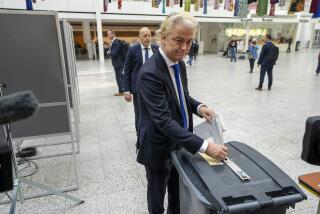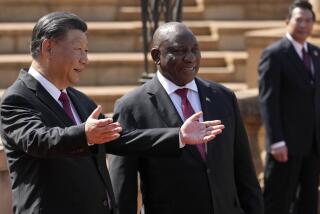Site of the Summit May Symbolize New Europe : Netherlands: The historic crossroads city may be where unification agreement is hammered out.
- Share via
MAASTRICHT, the Netherlands — The name of this obscure, southeastern city in the Netherlands is hardly a household word in Europe, let alone America. Most people have trouble pronouncing it.
Yet if the European Community summit meeting here today and Tuesday succeeds in hammering out a new accord on political and monetary union, a Treaty of Maastricht may take its place in history.
Lately, the city’s name has been blazoned across the European press under such headlines as “The Road to Maastricht,” “The Choice at Maastricht,” “The Meaning of Maastricht” and the “Maastricht Crossroads.”
In fact, Maastricht (the accent is on the second syllable), now something of a mini-symbol of European unity, began life as a northern European crossroads, founded by Roman legionnaires who built a fortified bridge across the Maas River here.
The city’s name from Latin means Maas Crossing, Maas being the Dutch version of a strategic river called the Meuse in France, which flows into the Rhine delta farther north.
As a measure of its military and commercial importance, Maastricht--halfway between Brussels and Cologne--once underwent numerous sieges, attacked variously by Prussians, Spaniards, Hapsburgs, Dutch and French.
Earlier, Charlemagne set up his residence at nearby Aachen and was crowned emperor of the Holy Roman Empire there.
The town’s patron, St. Servatius, was the first bishop of what is now the Netherlands.
In one of the sieges, Count d’Artagnan fell on the ramparts, inspiring Alexandre Dumas’ account of the “Three Musketeers.” There’s a small statue of the first musketeer here.
After the Congress of Vienna, Maastricht became part of the kingdom of the Netherlands.
Maastricht claims to be the oldest Dutch city and the first to be industrialized, with its traditional ceramics, glass and cement works.
The city escaped major damage in World War II and was liberated in September, 1944, by U.S. forces.
Today, the city of 120,000 points proudly to its central location in the undulating “Euroregion,” a tri-nation amalgam with Germany and Belgium, linked to the cities of Aachen and Liege.
Yet Maastricht has also managed to keep its charm as a lovely, historic town, with the Cathedral of St. Servatius at the center of squares and zigzag lanes and the Maas River flowing alongside castles and ancient, walled fortifications.
And windmills and water mills gracing the city are sure signs it’s in Holland.
During the Christmas season, the cobbled streets are jammed with shoppers and the bustling squares are filled with kiosks selling gifts and mulled wine.
Maastricht, with a Latin flavor far from the Calvinist Dutch coast, has plenty of churches and bars--in the words of an old saying, “more churches than weeks of the year, more bars than days of the year.”
One resident said: “We are French in our attitude to life. We enjoy the good life: good food, good shops, good clothes, pretty women.”
The town is packed with lively restaurants and cafes that attract tourists as well as fancy hostelries, such as the Michelin-starred Chateau Neercanne, where Queen Beatrix will host the EC heads of government.
In Maastricht, English, French and German are second and third languages and shops accept Belgian francs and German marks along with the Dutch guilder.
Maastricht captured some unwelcome limelight a decade ago when a previous European Community summit was held here. A tainted potato salad served at a welcoming buffet caused dozens of lower-level staff members and journalists to fall ill, prompting an unwanted civic sobriquet: “Gaastricht.”
This time, all has been carefully planned and inspected for what Mayor Philip Houben calls a “pan-European happening,” a festival of music, poetry and well-prepared food.
Maastricht’s strategic position has prompted an attitude that favors open borders, and the town has prospered from trade with others.
As industrialist Doeko Bosscher of the KNP paper company puts it: “We could never have grown like this with closed borders.”
Another businessman, Hans van Vliet, managing director of a company that manufactures ceramics, adds: “I feel Dutch--but at the same time, I feel at home when I go to France, or Germany or Belgium.”
Because of its position and publicity, one local official says, “Maastricht has now become the site of 20 international study institutes--like the European Institute of Public Administration--since the last summit.”
More to Read
Sign up for Essential California
The most important California stories and recommendations in your inbox every morning.
You may occasionally receive promotional content from the Los Angeles Times.










